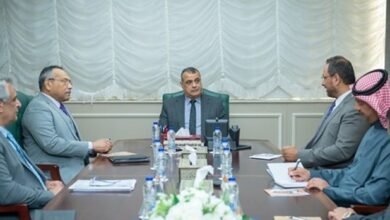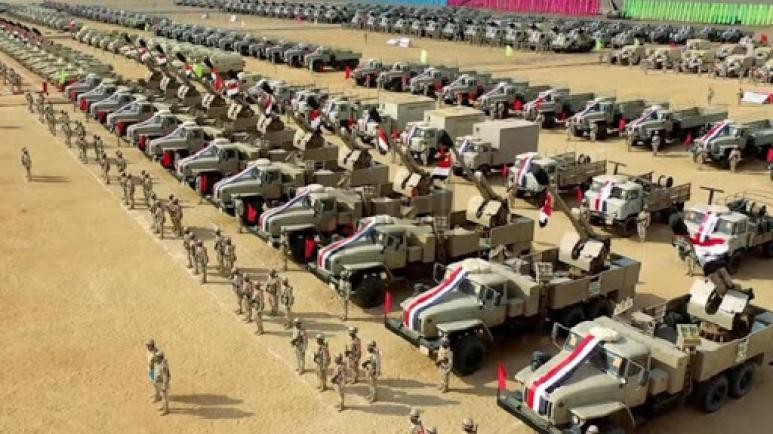In a Monday night television interview, two members of the Supreme Council of the Armed Forces (SCAF) denied all recent allegations of excessive use of force by the military and warned of counter-revolutionary forces trying to create a rift between the military and the people.
They announced that, after conferring with a committee of experts, the SCAF has decided to create a committee of national accord to lay the foundations of a new constitution before parliamentary elections in September. The SCAF then hopes that the new constitution will be ready before the presidential elections, which Mohamed al-Assar, a member of the SCAF, described as “the first free presidential elections in Egypt’s history”.
In the wake of strong condemnation of the military during last Friday’s protest in Tahrir Square and an ongoing sit-in denouncing the violence used against protesters early on Saturday morning and calling for the fall of field marshall Tantawy, Etman said that the trust between the military and the people will enable them to overcome attempts to cause rifts between them.
“The military is now the backbone of the nation and any attack against it is an attempt to destroy the nation’s structure, but we are confident that the people are too intelligent to fall in this trap,” said al-Assar.
Ismail Etman, head of the armed forces moral affairs unit, denied any use of live ammunition by the military on Saturday morning when the protesters, with people in military uniforms who had joined the protest amongst them, underwent a violent attack by military and police resulting in at least one death and over 70 injuries.
Etman said that military forces who stormed the square during the curfew hours on Saturday morning aimed at detaining those in military uniforms, who were in violation of the military law, and tried not to come into contact with other protesters. He said that military forces fired blank shots in the air and used other tactics to disperse the crowds surrounding their targets.
Eyewitnesses told a different story, alleging that the military attacked them and used live ammunition. They claim that the death toll is much higher than the one announced by the health ministry.
As for the over 40 civilians who were arrested on that day, Etman said that their arrests were justified as they tried to prevent military forces from carrying out orders.
A group of officers had joined the protests earlier on Friday and asked protesters to protect them. They joined the sit-in and were kept in a tent in the middle of the square surrounded by protesters.
Al-Assar blamed the incident on Ibrahim Kamel, former leading member in the National Democratic Party, who was detained for investigation. Al-Assar said that the incident bears a lot of resemblance to the 2 February attack on protesters known as “The Battle of the Camel”, which Kamel is also accused of being involved in.
“We issued a statement on 1 February saying that we would not use violence or live ammunition against the people, and we stuck to this commitment. There should be trust between the military and the people,” said al-Assar.
Etman said that those who joined the Tahrir Square sit-in on Friday are young officers who “are irresponsible and lack intellectual maturity”, adding that the lack of higher ranking officials at the sit-in shows that it was an individual act and is not symptomatic of any conflicts within the military.
Etman denied that any acts of torture had been perpetrated by the military, saying that it is an institution that respects human rights and that the rare violations that happened will be investigated.
Protesters who were detained when the military dispersed the Tahrir sit-in on 9 March testified to having been severely tortured by the military inside the Egyptian Museum and in the military prosecution. Females testified to having been forced to undergo "virginity tests". Amnesty International, among other human rights organizations, condemned the military for those practices.
As for the trial of civilians in military courts, Etman justified it by saying that it only happens in response to crimes that terrify civilians and jeopardize the security of the armed forces and the nation, like thuggery, armed attacks and property theft.
Many protests have been staged opposing military trials for civilians, highlighting that many of those who received military sentences hold college degrees and respectable jobs, making them unlikely to be "thugs". The sentences were often issued a few days after arrest, following short trials to which lawyers and defense witnesses were denied access.
Etman maintained that Michael Nabil, the blogger who was sentenced to three years in prison on Monday, was tried fairly in the presence of six lawyers.
Nabil was arrested two weeks earlier following an article he published on his blog documenting the military’s violations since the start of the revolution. He has been blogging against the military and calling for the cancellation of mandatory military service.
Etman said that Michael’s actions were punishable by the law that criminalizes any actions or words that harm the armed forces. He added that Nabil’s articles had a negative influence on the youth being drafted into the military, and jeopardized Egypt’s national security. He added that there was a possibility that he was being encouraged by foreign elements.
“Freedom of expression is guaranteed as long as it is respectful and doesn’t question the armed forces,” says Etman.
Nabil’s lawyers and family claim that they were absent during his sentencing because they were misinformed of the date. The sentencing caused a lot of discontent among the public, which interpreted it to a violation of freedom of speech.
Responding to public complaints about the slow pace of the prosecution of corruption cases, al-Assar said that any “unnecessary” rushing could cause loopholes that could be used by the defense to acquit the defendants.
Al-Assar denied allegations that the Saudi government is pressuring the army to acquit Mubarak, saying that he attended two meetings with the Saudi foreign ministers in which the issue was never brought up.
While he justified the military prosecution of civilians accused of thuggery, Etman said that the prosecution of figures from the former regime is not within the military’s area of expertise and is left to the general prosecutor.
Al-Assar said that investigations regarding the use of live ammunition against protesters are nearing an end.
In response to the public discontent with the financial nature of most of the charges pressed against the fallen regime — ignorning their political crimes — al-Assar said that Egyptian law doesn’t penalize political corruption. He said that such a law might be created, but that it wouldn’t be used in retrospect against the former officials.
While he supported the protests on Friday, Etman requested the people to stop sit-ins and other protests, which he said cause unrest that drives away foreign investment and makes it difficult for Egypt’s embattled economy to recover.
“We are facing economic challenges, and whenever the situation starts to stabalize, something happens to disrupt it. We respect everyone with an opinion, but there’s a time for every demand,” said Etman.
Both SCAF members asserted that the armed forces belong to the people and supports all their demands, and asked the people for patience, promising them a future of democracy and prosperity.




